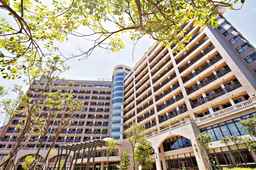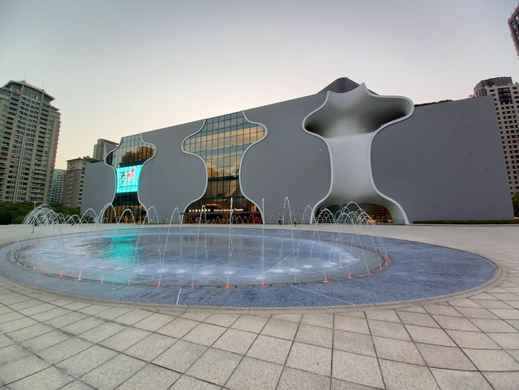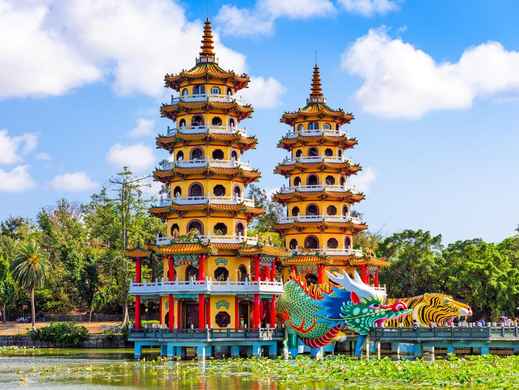



Hsinchu City
Asia
/
Taiwan
/
Hsinchu City
Hsinchu City is the capital of Hsinchu County, located in northwestern Taiwan. The city is nicknamed the "city of wind" because of its geographical location which makes the climate in this city windy.
In addition to its nickname, Hsinchu also has complete natural attractions. Starting from cycling along the coast of Hsinchu Beach, hiking at Eighteen Peaks (Shibajian), and seeing the city view from above in Shei Pa National Park. All these outdoor activities can be done easily in Hsinchu City.
The city also combines nature with culture and interesting tourist attractions, to delicious food. The city has iconic landmarks, such as Chenghuang Temple or Hsinchu City God Temple, a place where locals and tourists gather to pay their respects and enjoy the spiritual atmosphere. Visitors can also sample local snacks along the temple's streets, including Hsinchu rice noodles.
Hsinchu City is also home to technology and industry in Taiwan, such as glass products and the many technology companies in the city. Visit the Hsinchu Glassworks Museum, which records much of the history of glassmaking around the world. There is also the Hsinchu Science Park, which is home to more than 400 technology companies.

Get to Know Hsinchu City
Take a tour of this destination's highlights

Travel Tips for Hsinchu City
What you need to know before traveling here
Getting Around Hsinchu City
A guide to Hsinchu City's local transportation
You can travel around Hsinchu City by train. Train travel within Hsinchu city costs NTD 20 to NTD 50. By taking the train, you can visit the city center, Hsinchu City God Temple, Green Grass Lake, and others.
Practical Tips for Hsinchu City
Things to prepare and best way to visit
The most common and efficient way is to take a train to Hsinchu Railway Station. Trains run regularly from major cities such as Taipei, Taichung, and Kaohsiung, providing a comfortable and scenic journey.
Train fares vary based on factors such as distance traveled and the class of service. For standard trains, prices typically range from NTD 100 to NTD 500, depending on the departure point. High-speed rail tickets may cost more, with prices ranging from NTD 700 to NTD 1,500.
Hsinchu can be reached in 30 minutes-2 hours from Taipei, 1.5-2.5 hours from Taichung, and 1.5-4 hours from Kaohsiung. Travelers can choose from various classes, including standard, business, or first class, each offering a different level of comfort and amenities during the journey.
There are many historical highlights in Hsinchu City for visitors to explore, such as the Hsinchu City God Temple, a landmark in the city's downtown area and the city's Buddhist spiritual center. Built in 1747, the complex is adorned with carvings and bustling decorations, making it a place to take a short break and calm the mind.
Also within an 8-minute walk of Hsinchu City God Temple is Hsinchu East Gate (Yingximen). A traditional city gate that dates back to the Qing Dynasty in 1826. The gate symbolizes the history and power of Hsinchu in the past, and is now a must-see for tourists.
Beyond its dynastic history, Hsinchu is also a city that produces glass. To learn about its history, visitors can visit the Glass Museum of Hsinchu City with an entrance fee of NTD 50. Here, there is an impressive collection of glass artworks, ranging from local to international artists.
Hsinchu City's nickname, "City of Winds", is due to its geographical location, which exposes the city to northeast monsoon winds throughout the year. Because of this, the winds in Hsinchu City can help cool down the humid summer months, but during the winter months, the city can get very cold.
As a tourist, you should avoid visiting during the typhoon season, which is from July to October. However, visiting in spring (March to May) and fall (September to November) is still recommended. These months are the most ideal weather for exploring Hsinchu City. Cool temperatures and blooming natural scenery make these seasons ideal for outdoor activities.
Treat your taste buds to an exploration of Hsinchu City's culinary specialties. Start by enjoying the famous Hsinchu rice noodles, a local specialty with chewy, translucent noodles soaked in broth.
Located on the coast, Hsinchu is also famous for its seafood. From shrimp to fish, it's served in many preparations, including crispy tempura, grilled squid skewered like skewers, and more.
For a more local twist, you can try Ya Zhen Hao Sticky Soup, which is sticky rice balls. Go for the creamy Douhua (tofu pudding) as a sweet and refreshing dessert garnished with various toppings.
For nature lovers, you can visit Hsinchu Beach, where you can take a leisurely stroll on the beach, have a picnic, sunbathe or splash around. You can also visit Eighteen Peaks Mountain for a refreshing hike at a high altitude and enjoy the view of the city.
There is also Green Grass Lake, a lake surrounded by lush gardens. You can take a leisurely stroll or boat ride in the middle of this serene lake. When night falls, you can sample local food at the bustling Green Grass Lake Night Market.
Finally, there's the Hsinchu Municipal Government Hall, also known as Hsinchu City Hall. This venue is commonly used to hold cultural events and meetings. However, visitors can explore the surrounding square. The building is unique, combining contemporary elements with traditional aesthetics.

Explore Hsinchu City
Create your itinerary with our top picks below

Get to Know Hsinchu City

Travel Tips for Hsinchu City

Explore Hsinchu City
More Destination Near Hsinchu City























 Facebook
Facebook Instagram
Instagram TikTok
TikTok Youtube
Youtube Twitter
Twitter Telegram
Telegram WhatsApp
WhatsApp
